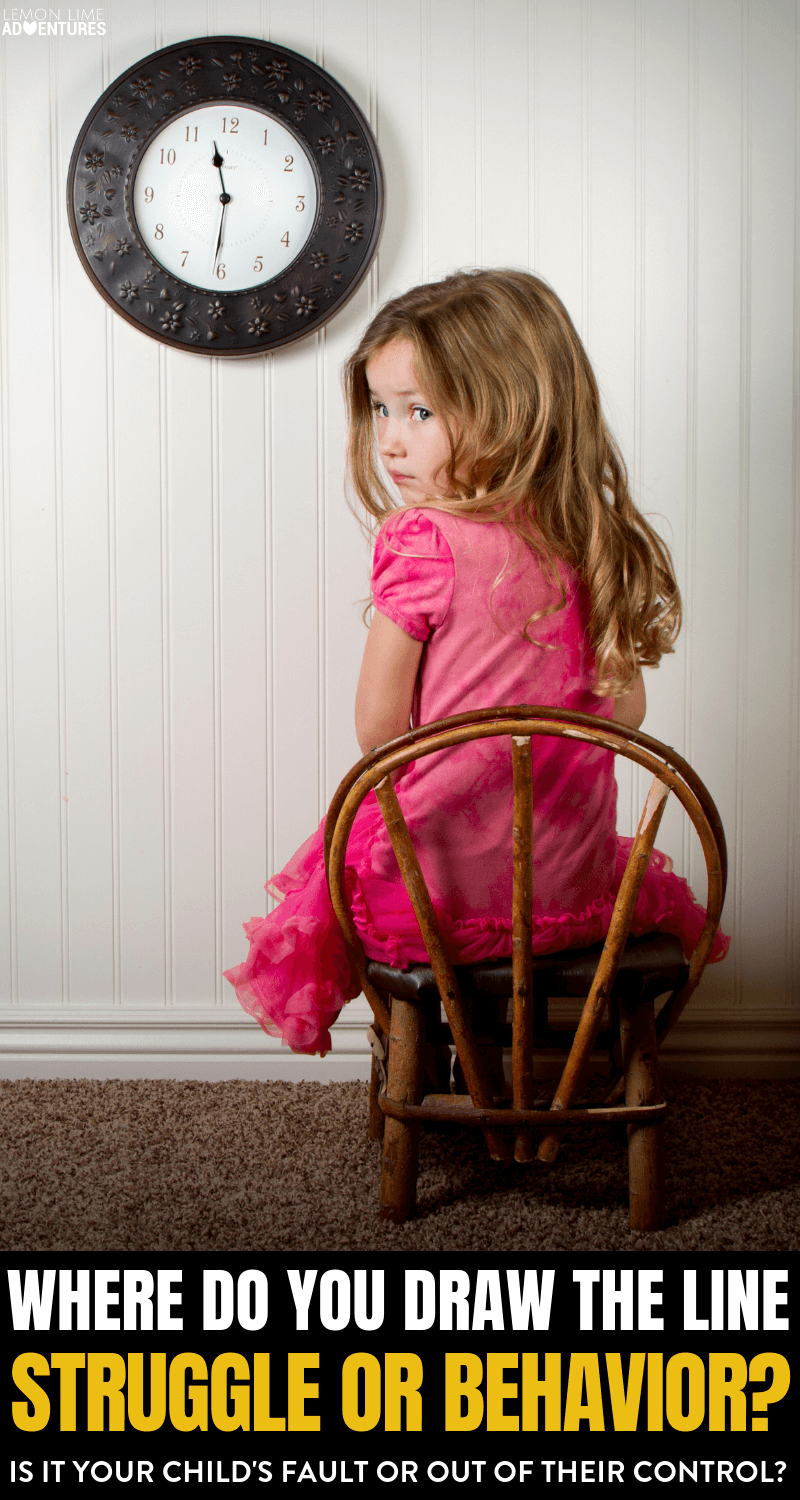(Inside: Is it a struggle or a behavior… Where do you draw the line? Is your child’s behavior your child’s fault or out of their control?)
How do you know when to draw the line?
When your kid is talking back to you, how do you know if they are just pushing all of your buttons or if they’re struggling with something?
Where is that fine line between “my kid is struggling with something“ or “my kid is just trying me, and my kid is just doing all the things to try to get under my skin“?
How do you make that distinction?
I get this question all of the time.
As a matter of fact, I just asked in one of my free communities, “if I could answer one question for you, what would it be?”
And someone asked me, “Well, how do I draw the line? How do I know when my kid isn’t just pulling my chain or just pushing my buttons or worse, being a brat?“
A lot of people call their kids brats. How do you know when that’s not happening, and instead, my kid is struggling with something?

*This post may contain affiliate links. Please see disclosure for details.
Where Do You Draw the Line Between Struggles and Behaviors?
Many of the parents I help have kids who are what I like to describe as “out of the box.”
Maybe they think differently, maybe they process information differently, maybe they have an official alphabet soup of diagnoses.
Maybe they have SPD or they have anxiety or they have ADHD or they’re on the spectrum. Or they might just struggle in school.
They might be aggressive. They might be defiant. Or disrespectful.
And this question comes up all the time. “Is it sensory, or is it behavior?” “Is it anxiety, or is it defiance?”
Usually, when people are asking me “is it this or this,” they are usually asking me, “is it something my kid can control or is it something that my kid cannot control?”
I want to talk to you today about how I decide that fine line between struggles and behaviors, and how I go through every single day when those behaviors creep up what outlook I have during those moments.
“What would you do?”
Whenever I am asked this question, it reminds me of a story that happened just a couple of months ago over the summer.
I was scrolling through my Facebook feed, and someone in my Facebook feed said, “Oh my, gosh, what would you do if you had a kid who was constantly talking back to you and was using curse words and was just outright disrespectful to their parents. What would you do?”
Me with my kid brain hat on, I went to go comment and what I found in the comments just broke my heart.
“I would show him who’s boss”
“I would kick him in the pants“
“I would ground him for life“
“I would take away all of his things“
It just kept going and going…
“I would do this”
“I would do this”
“I would do this”
And every single “I would do” was punitive and controlling and was nothing that would give that kid any incentive to be respectful on the other end or to change his behavior.
Really, I think it would just push him away even more.
I commented, “You know what I would do is I would take some time, and I would figure out what is going on with that kid”
This kid’s been treated this way his whole life. When he makes a mistake, he gets punished. When he acts a certain way, he gets something taken away.
Now he’s a teenager, and he is rebelling andbeing extremely disrespectful to any adult that’s in his life because it’s easier to push them away than it is to have them push him away.
So I stood my ground and said, “You know what? It might be really hard to get below the surface with this kid because he is going to have up all kinds of walls, but I would definitely try to figure out what’s going on, and I would make sure he’s clear on the boundaries.
I would find out if he’s struggling with something, if he’s upset about something, and what is causing this frustration that’s coming out as defiance.”
Man, people did not like that answer. They didn’t at all.
Okay, but my kid has…
When I’m helping parents with their children’s behaviors, I hear things like this a lot…
“He has autism, so it’s not his fault.”
“My daughter has ADHD, so she can’t do this,”
“My son has sensory processing disorder, so he does this.”
And those can all be valid things lurking under the surface and contributing to your child’s behavior.
But in reality… There is one truth behind every single behavior.
I know that that seems really crazy, and you’re probably thinking, “Dayna, you can’t be black and white like that. It’s one of the other. It’s either caused by something, and they can’t control it, and I need to allow it and accept it and just go with it, or they can control it, they’re being manipulative, and I need to nip it in the bud, and get really strict so that they never do this again.”
The One Truth Behind Every Single Behavior…
I’m here to tell you that my answer’s actually very different.
I’m not going to tell you that you should completely dismiss it and pass it off because it is a struggle that they are destined to continue to struggle with their entire life, and I’m not going to tell you to punish it out of them either.
What I’m going to tell you is that I approach every single behavior with one mindset in mind.
It is really hard to do at first, but I approach every single behavior as communication.
My child is trying to tell me something, and they can’t get through this situation with the skills, knowledge, and emotional regulation that they currently have.
They might need help getting through this situation.
And then in the future I can build them up so that they can get through this without me holding their hand and talking them through it.
And what happens when I change my mindset to believe that behavior is communication, my child is trying to tell me something, and my child needs something to get through this situation…
When I can change my mindset that way, it completely changes my reactions.
All Behavior is Communication
Instead of being pissed off at my son’s behaviors or my daughter’s behaviors or the way that my child talks to me, I see it as, “Wow, okay. They must be really struggling with something because I know that I have not taught my children to speak to me that way. I know that I model kind words to them. I know that we work together as a family. I know that we are connected and we are loving. They’re having a really hard time right now, so I need to get to the bottom of what’s going on.“
It hasn’t always been like this… It hasn’t always been this easy.
But the very first step anytime I start to struggle with any of my kids’ behaviors, I remind myself to go back to the belief that they’re struggling with something.
Because when I approach their behavior as communication, or that they are struggling with something, it takes out all the emotion, all of the blame, all the ugly thoughts that come into our head when we think our kids are doing it to us.
When we think our kids are just doing things to get under our skin or to be “brats” or to be strong-willed or obstinate or defiant… We are going to see more of that behavior because that’s what we’re focused on.
We are going to fixate on it until we are frustrated and in a bad mood, and having a really hard time connecting with our kids.
And when you’ve hit that point, it’s really hard giving them strategies to change. And, really, we’re going to be pushing our kids away.
But if we can come at it is, “Okay, my kid’s trying to tell me something. I have no clue what they’re trying to tell me, but they’re telling me something…” everything will change.
And it is okay to own the fact that you don’t know what they’re trying to tell you, but just opening up to the possibility that their behavior is because they’re struggling with something and that they need your help.
Now, This Does Not Dismiss the Behavior…
Now, whenever I write a post like this, there inevitably will be people in the comments that will say, “well, you’re just raising snowflakes then,” or, “you are not raising kids who are going to be respectful”.
They will say, “this is what’s wrong with the world today,” and, “you’re just a terrible parent,“ and, “your kids are going to grow up and not be able to take care of themselves”.
I’m here to tell you that the complete opposite is happening.
When I’m able to look at behavior as communication, I’m able to connect with my son and talk with him. I’m able to help him develop his skills.
He actually wants to do the activities, strategies, and tools that will help him be successful and independent in the future.
He doesn’t fight me over morning routines. He turns off electronics when it’s time. He works on things that are struggles for him.
He didn’t used to do that when I was berating him and telling him all the things he was doing wrong. He didn’t want to work with me. He didn’t want to work with his teachers when his teachers were just suspending him.
None of that stuff actually helped.
What really helped my son, got him on board, and helped him actually change his behaviors all started with a simple approach…
“Okay, what is he struggling with? What does he need, and how can I help him, and how can I build him up so that next time he will have an inch more of strength and an inch more confidence and an inch more skills and an inch more of what he needs to be successful the next time?”
What if We Let Go of the Assumptions?
I know I’m going on a little rant here, but this one fires me up because we get so caught up in our kids behaviors being this or that, and we miss what’s really happening.
What’s really causing the behavior. What’s really lurking under the surface that we can help with so that our kids are a little more successful next time.
All we are doing is assuming the best in our kids instead of assuming the worst.
We are assuming that they want to do well and be successful.
We are assuming that they want to make us happy, that they want to be loved.
We are assuming that they want to make friends, and they want to be with other people.
If we assume that, we are going to find the good in them. We are going to find their superpowers, and that is when they’re going to be successful.
I challenge you to dig deeper to see what’s really behind the behavior you’re struggling with…
Because your child’s behaviors are much like an iceberg. On the surface you see…
* a child that is clingy and doesn’t like to be alone
* a child that crosses his arms and shuts down
* a child that is scared of ever getting a wrong answer
* a child that doesn’t like to go new places
Or a child that becomes “hyper” when new guests arrive at your house.
It’s easy to look at these behaviors as just what we see. It’s easy to make assumptions about why our children are acting out or doing inexplicable things.
However, I challenge you to look for the other 85%. Look deeper.
What’s hiding behind what you see?
Right now you can download a FREE Kid’s Listening Poster Pack on how to get your kids to listen and follow directions. These posters give you tips on how to get your kids to do what you ask, without refusing, running away, or ignoring you!







BRILLIANT.
Just brilliant.
THANK YOU.
Very insightful! I love how it takes the reader step by step through both the parent’s and the child’s reaction, behavior and options. It’s definitely worth looking deeper, as you mentioned. I also liked the paragraph saying “Now this does not dismiss the behavior”… because as you alluded to, even if a child is not neurotypical, at the very least the behavior is a cry for help from them. Plus I feel it’s not acceptable for other kids or parents to have to be exposed to hitting, foul language, etc. But looking at the behavior firstly as a cry for help is actually helpful, and moving to make changes then and there is important. Thanks for a fantastic article.
Brilliant advice! If only I could get my principal to believe this and not judge me for not managing my class military style :(.
I have been told that I invest too much into the kids I teach and that if I delve into emotions then I will open a can of worms. Also that all kids just need a consistent, structured environment where they are so busy that they won’t have time to think about any issues going on :/
Finding it hard to strike the best balance to please people.
Behavioral Development is an important part of child development. Social and learning behaviors play a key role in improving child academic performance. How to develop the social behaviors is crucial task for parents.